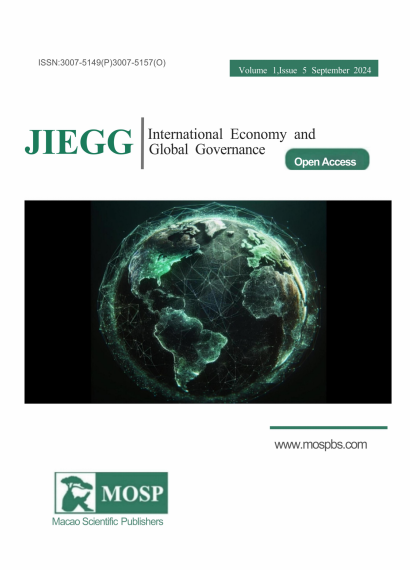-
World Trade Organization. (2019, April 26). Russia – Measures concerning traffic in transit (WT/DS512/7). https://docs.wto.org/dol2fe/Pages/SS/directdoc.aspx?filename=q:/WT/DS/512R.pdf&Open=True.
-
Lindsay, P. (2003). The Ambiguity of GATT Article XXI: Subtle Success or Rampant Failure?. Duke Law Journal, 52, 1277-1313.
-
Hartmann, S. (2019). Russia – Measures Concerning Traffic in Transit (WTO). International Legal Materials, 58(5), 899–1027.
-
World Trade Organization. (2020, June 16). Saudi Arabia – Measures concerning the protection of intellectual property rights (WT/DS567/R). https://docs.wto.org/dol2fe/Pages/SS/directdoc.aspx?filename=q:/WT/DS/567R.pdf&Open=True.
-
World Trade Organization. (2022, December 9). United States – Certain measures on steel and aluminium products (China) (WT/DS544/R). https://docs.wto.org/dol2fe/Pages/SS/directdoc.aspx?filename=q:/WT/DS/544R.pdf&Open=True.
-
World Trade Organization. (2022, December 21). United States – Origin marking requirement (WT/DS579/R). https://docs.wto.org/dol2fe/Pages/SS/directdoc.aspx?filename=q:/WT/DS/597R.pdf&Open=True.
-
Li, X. L. (2023). Security Exceptions in the WTO System: Evolution of Practice, Path Selection and Proposals on China’s Position. Chinese Review of International Law, (3), 25-48.
-
Kho, S., McNamara, Y., Kirwin, S., & Davies, B. (2023). The conundrum of the essential security exception: Can the WTO resolve the GATT Article XXI crisis and save the dispute settlement mechanism? Centre for Trade and Economic Integration (CTEI) Working Paper. Graduate Institute of International and Development Studies. https://repository.graduateinstitute.ch/record/301872?v=pdf.
-
Heath, J. B. (2020). Trade and Security Among the Ruins. Duke Journal of Comparative & International Law, 30, 223-266.
-
Bown, C. P., Jung, E., & Zhang, E. (2018, November 15). Trump’s Steel Tariffs Have Hit Smaller and Poorer Countries the Hardest. Peterson Institute for International Economics. https://www.piie.com/blogs/trade-and-investment-policy-watch/trumps-steel-tariffs-have-hit-smaller-and-poorer-countries.
-
Sanklecha, J. M. (2021). The Limitations on the Invocation of Self-judging Clauses in the Context of WTO Dispute Settlement. Indian Journal of International Law, 59, 77–109.
-
Xu, C. (2019). A Critical Analysis of Panel’s Interpretation of Article XXI of GATT and China’s Approach to Reforming the Security Exception. Information Security and Communications Privacy, (7), 38-51.
-
World Trade Organization. (2016, June 22). Colombia – Measures relating to the importation of textiles, apparel and footwear (WT/DS461/AB/R). https://docs.wto.org/dol2fe/Pages/SS/directdoc.aspx?filename=q:/WT/DS/461ABR.pdf&Open=True.
-
Vidigal, G. (2019). WTO Adjudication and the Security Exception: Something Old, Something New, Something Borrowed – Something Blue?. Legal Issues of Economic Integration, 46(3), 203-224.
-
General Agreement on Tariffs and Trade. (1986, November 19). Minutes of meeting held in the Centre William Rappard on 5–6 November 1986 (C/M/204).
-
Ranjan, P. (2020). National Security Exception in the General Agreement on Tariffs and Trade (GATT) and India–Pakistan Trade. Journal of World Trade, 54(4), 643-665.
-
Boklan, D. & Bahri, A. (2020). The First WTO’s Ruling on National Security Exception: Balancing Interests or Opening Pandora’s Box? World Trade Review, 19(1), 123-126.
-
Hahn, M. J. (1991). Vital Interests and the Law of GATT: An Analysis of GATT’s Security Exception. Michigan Journal of International Law, 12(3), 558-620.
-
Wang, E. (2019, May 14). China’s Kunlun Tech Agrees to U.S. Demand to Sell Grindr Gay Dating App. Reuters. https://www.reuters.com/article/us-grindr-m-a-beijingkunlun-idUSKCN1SJ28N.
-
Shepardson, D. & Wang, E. (2020, December 5). US Not Extending TikTok Divestiture Deadline, but Talks Will Continue: Sources. Reuters. https://www.reuters.com/article/us-usa-tiktok-exclusive-idUSKBN28F00V.
-
Lin, J. M. (2020, December 31). China Further Strengthens National Security Review of Foreign Investment. Nation Law Review. https://www.natlawreview.com/article/china-further-strengthens-national-security-review-foreign-investment.
-
Saha, S. (2012). CFIUS Now Made in China: Dueling National Security Review Frameworks as a Countermeasure to Economic Espionage in the Age of Globalization. Northwestern Journal of International Law & Business, 33(1), 199-235.
-
Ralls Corporation v. Committee on Foreign Investment in the United States, 758 F.3d 296 (D.C. Cir. 2014).
-
Wang, Z. (2016). CFIUS under Review: National Security Review in the US and the WTO. Journal of World Trade, 50(2), 193–218.
-
World Trade Organization. (1994). Agreement on trade-related aspects of intellectual property rights. United Nations Treaty Series, 1869, 299.
-
World Trade Organization. (1994). General agreement on trade in services. United Nations Treaty Series, 1869, 183.
-
World Trade Organization. (1994). Agreement on trade related investment measures. United Nations Treaty Series, 1868, 186.
-
World Trade Organization. (1998, July 23). Indonesia – Certain measures affecting the automotive industry (WT/DS54/R, WT/DS55/R, WT/DS59/R, WT/DS64/R). https://docs.wto.org/dol2fe/Pages/SS/directdoc.aspx?filename=Q:/WT/DS/64R-03.pdf&Open=True.
-
Sornarajah, M. (2010). The International Law on Foreign Investment (3rd ed.). Cambridge University Press.
-
Bacchus, J. & Lester, S. (2020). The Rule of Precedent and the Role of the Appellate Body. Journal of World Trade, 54(2), 183-198.
-
Mishra, N. (2020). The Trade: (Cyber) Security Dilemma and Its Impact on Global Cybersecurity Governance. Journal of World Trade, 54(4), 567-590.
-
Heath, J. B. (2020). The New National Security Challenge to the Economic Order. Yale Law Journal, 129(4), 1020-1098.
-
Xu, C. (2019). A Critical Analysis of Panel’s Interpretation of Article XXI of GATT and China’s Approach to Reforming the Security Exception. Information Security and Communications Privacy, (7), 38-51.
-
Pinchis-Paulsen, M. (2020). Trade Multilateralism and U.S. National Security: The Making of the GATT Security Exceptions. Michigan Journal of International Law, 41(1), 109-193.
-
Lang, A. & Scott, J. (2009). The Hidden World of WTO Governance. European Journal of International Law, 20(3), 575-614.
-
Lester, S. & Zhu, H. (2019). A Proposal for ‘Rebalancing’ to Deal with ‘National Security’ Trade Restrictions. Fordham International Law Journal, 42(5), 1451-1474.
-
Lamp, N. (2019). At the Vanishing Point of Law: Rebalancing, Non-Violation Claims, and the Role of the Multilateral Trade Regime in the Trade Wars. Journal of International Economic Law, 22(4), 721-742.

